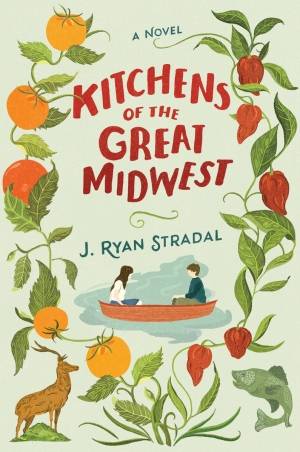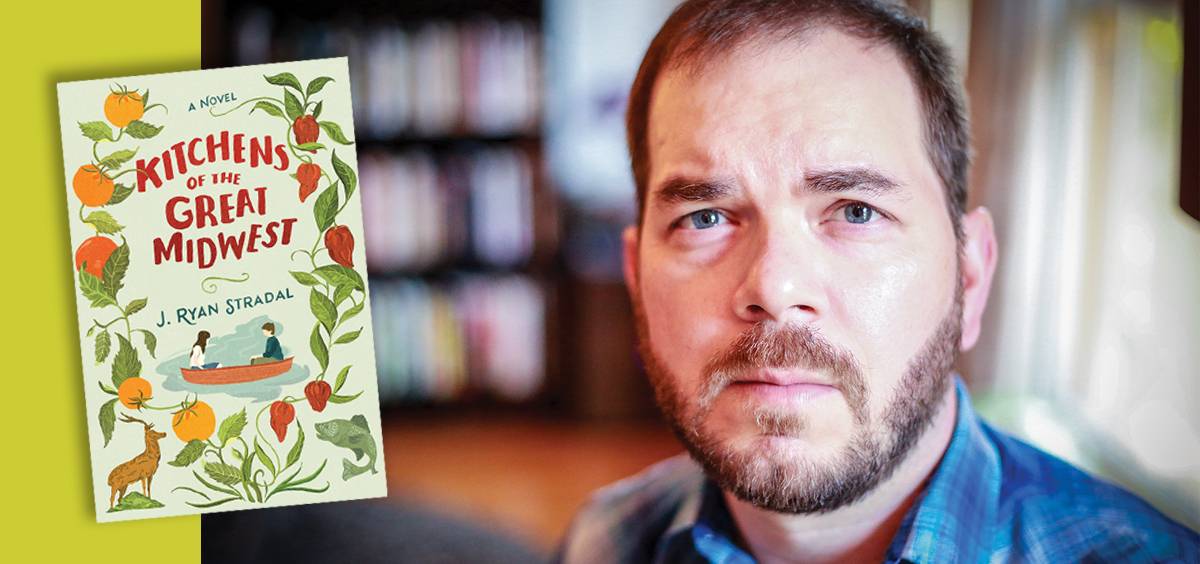Summer Reading is a phrase that evokes memories of childhood, and possibly leads to the conclusion that teachers, librarians and parents were all colluding to get “just 20 minutes of silence, please, for the love of mike?” While there may be an element of truth to that, libraries these days are using the vacation as a reason to engage folks of all ages; both our local libraries have prizes to win for readers at the Juvenile, Teen, and Adult levels. At Champaign Public Library, this year’s theme for grown-ups is “Reading Is So Delicious”, and they’ve been displaying, recommending and creating events based around food. As such, a featured book for the season has been Kitchens of the Great Midwest — certainly an appropriate title all around – and the novel’s author, J. Ryan Stradal, will be appearing at the library on Wednesday evening.
Stradal’s award-winning, bestselling debut novel uses the distinctive mechanic of telling one woman’s story from the perspective of the people she knows at different stages of her life. As she rises to fame as a chef, we only hear Eva’s internal monologue in one chapter and then exclusively interact with her through external sources. The author says, in a previous interview, that he chose this method of storytelling because he thinks people are more likely to believe what a person says about someone else over what a person says when talking about herself. It’s an interesting thought, and the result was an intersectional story where I was left wondering about all of the people I encountered, making me ruminate about the novel more than I have about more linear tales.
My interview with the author made me think that perhaps this was his intended effect all along. While we were talking, not in relation to any particular question, he shared this with me:
“I feel like every book I write has at its genesis a puzzle, something I want to share, that I want to unpack in front of other people. I don’t share everything that I’m thinking, or everything that I know about my characters, because I want to participate with my readers, discovering the answers, because I don’t have all of them. I’m confused and delighted about a lot of things in the world that I write to discuss. I think if I’m lucky enough to have readers, they will complete my sentences for me, and help me unpack some of the ideas I haven’t completely solved.”
Eva Thorvald is quite the puzzle, and one I’m still attempting to solve. I was tempted to ask Stradal myriad mystery-solving questions about the book’s content, such as, “How did she know about the pork shoulder?” or “If she was curating the guest lists, why did she invite the husband instead of Cynthia directly?” or “Was Braque having a mental breakdown, or was that just magical realism?” and lastly, “Why would you ever put graham crackers in a peanut butter bar?” (Ok, I did ask that last one, and the answer is that it gives the peanut butter structure, but as an Ohio native, I am still slightly agog. I suppose literature can help me learn to accept regional culinary differences.) Regardless, I put all those tendencies aside and sought more about the author and what we can expect during his appearance this week. Thankfully, there’s a Q&A element to the talk, so we’ll all have opportunities to get our questions answered. You haven’t heard the last of me yet, J.Ryan!
SP: I’ve read that you consider each character a part of you, but that Eva is an idealized version of what you want to be, coping with things in ways you wish you could have. Is there a particular example of that you can point to?
 Stradal: Let’s start with the bullies: I got picked on quite a bit as a little kid, and I always wanted to get back at them, but I never did. She did, using the skills available her — she didn’t do anything particularly violent or untoward, she didn’t have to use a gun or a knife or a weapon — she used her emerging skill as a chef and pepper grower. That kind of resourcefulness and decisiveness was something that I didn’t have when it came to conflict resolution, so that part was a little bit of wish-fulfillment.
Stradal: Let’s start with the bullies: I got picked on quite a bit as a little kid, and I always wanted to get back at them, but I never did. She did, using the skills available her — she didn’t do anything particularly violent or untoward, she didn’t have to use a gun or a knife or a weapon — she used her emerging skill as a chef and pepper grower. That kind of resourcefulness and decisiveness was something that I didn’t have when it came to conflict resolution, so that part was a little bit of wish-fulfillment.
Additionally, being so focused on what she wanted to do with her life at an early age and pursuing that with alacrity. I’d always wanted to write novels, but I felt like it was something I didn’t have the skill to do or the focus to do when I was younger. I was really scared of writing prose very seriously, I didn’t start doing that until my late twenties. Since then, I’ve had a serious focus on reading and writing and trying to develop ways to think harder about what I write and putting more into it.
SP: Since you’re more focused on writing, would you talk a little bit about the book you’ve been teasing since summer of 2015?
Stradal: It involves multiple generations of a single family. Unlike Kitchens which focused on family & friends who knew each other tangentially or hardly at all, in this book, everyone knows each other.
SP: And is it still tied to Pat Prager?
Stradal: Yes! Pat’s a pretty minor character in this book. Her mom, niece and nephew are the three major characters and get the most [Point-of-View] chapters. Unlike my previous book, in this one, POV characters recur: there are multiple opportunities to follow each character.
SP: [exaggerated shocked gasp] I don’t know what to do with that!
Stradal: [laughing] Yeah, it’s a little more straightforward from a narrative standpoint, it’s been much harder to write. I think I’ve been doing my best writing; I feel good about the overall storyline. I’ve done the usual thing where I’ve written too much and now need to pare it back. With Kitchens, there were whole ingredients brought by different people that didn’t make the book – they were actually pruned out before I sent it to the publisher.
SP: So we’ll get a 25th Anniversary edition with apocrypha?
Stradal: [laughing] Maybe, yeah, that’d be funny: Kitchens – The Leftovers.
SP: Any hints about the plot?
Stradal: It’s based on something that happened in my own family: in the late 1960s, my dad’s family farm was sold except for a couple of acres that were cut off from the main farm by a county road that was built a few decades before. That part stays in the family, and is now more valuable than what the rest of the farm sold for. It’s a point of contention in my family, my Uncle Paul owns it, and he doesn’t think he’ll sell it; it’s a valuable piece of property, and it’s undeveloped, and it just kind of sits there. Whereas in the book, that’s not the case, it’s a sad little piece of land in Minnesota and the person who owns it has a strong sentimental attachment. It spills over into the next forty-odd years, where the grandchildren have to deal with it. That’s where it stands now, but it definitely could change.
SP: I look forward to seeing that on library (and bookstore) shelves! Since you’ll be presenting at the library: you’ve said that your mother really instilled a respect for authorship in you, and that you relied on the library as a kid. But it’s 25 years later, the world has changed quite a bit, and there’s a vocal viewpoint that libraries may not be as necessary as places that hold books. As an author, what’s your view of libraries as a step between author and reader?
Stradal: As an author, I feel like [a library] helps me connect with people that can just walk into the library’s event room and meet an author. The library isn’t explicitly a place of commerce. It’s like meeting in a park in some way, or in a neutral location, a place that’s as much theirs as it is mine, or more theirs because it’s their library. There’s nothing prohibitive about a library, it doesn’t have to make a certain amount of money, there’s not an expectation that you should buy a book to assert your sense of belonging there: you’re a citizen at a library.
Although I deeply admire the independent bookstores who have supported me in my young career, I feel like I was a library kid. A place like that didn’t need any of my paltry resources in order to survive on its own. I had programs and employees that reached out to me, and helped me create a voice, and helped me connect with books which were influential to me. I don’t know where I’d be without it.
Libraries have connections, they’re a community enterprise, they’re connected to the city government, or county government, and they’re connected to schools and civic groups and can bring them together in a way that no other enterprise can. To be able to participate in a library event is a real blessing.
SP: Wow, blessing is a pretty amazing word. I know as a citizen* of Champaign-Urbana, I feel pretty lucky that such a celebrated author has agreed to come to our town. What do you have planned for us on Wednesday?
Stradal: I’m planning on talking about my journey as a writer, how the book came to be, how someone like myself from a small town in Minnesota somehow ended up on the New York Times bestseller list. I have no idea how that happened, but I can try to explain it. I’m in a place where I feel like I can explain how to do what I’ve done, as humorously as possible. That said, I’ve felt like my hometown experience in Minnesota is very much the foundation of who I am, and so much of my life has been reconciling my somewhat simple small town upbringing with my big city aspirations, and not really wanting either one of them to overtake me, or define me. As such, I feel much like Eva does, but she does it much more gracefully.
—
Whether or not you’ve read the book Kitchens of the Great Midwest, J.Ryan Stradal has an appealing manner and an easy way of speaking that should make for an interesting and enjoyable evening at the library. Barnes & Noble will be on hand to Champaign Public Library will be selling copies of the novel to have signed, but as the author said, it is by no means a requirement for entry. Come to listen, have your questions answered, and share a moment with an author of national renown. Through the support of The Friends of Champaign Public Library, the event will be held in Robeson A&B inside CPL, 200 W. Green St., beginning at 7 p.m. on Wednesday, July 27th.
*Full Disclosure: rebecca knaur is employed by the Champaign Public Library as well as Smile Politely. Only Smile Politely paid for this article.
About rebecca knaur:
As Arts Editor for Smile Politely and having two other book-related professions, rebecca was the natural choice for this interview. Had it not been summer, however, she would have assigned it to some other writer to avoid conflict of interest, but them’s the breaks in a college town. Tell her how unprofessional she is via Twitter @rknaur or by emailing her @sp.com
REVISION: an earlier edition of this article stated that Barnes & Noble would be the selling agent for the books, but this has been corrected by sources at CPL & BN.









 As Arts Editor for Smile Politely and having two other book-related professions, rebecca was the natural choice for this interview. Had it not been summer, however, she would have assigned it to some other writer to avoid conflict of interest, but them’s the breaks in a college town. Tell her how unprofessional she is via
As Arts Editor for Smile Politely and having two other book-related professions, rebecca was the natural choice for this interview. Had it not been summer, however, she would have assigned it to some other writer to avoid conflict of interest, but them’s the breaks in a college town. Tell her how unprofessional she is via